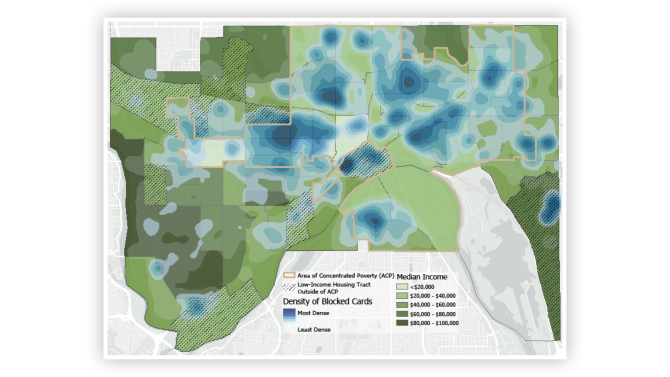Fine Free: Background and History
Learn more about the library's original proposal to eliminate late fines.
Improving access to your library
The library's original proposal to eliminate late fines was approved by the City Council in December 2018.
To learn more about the approved policy, visit sppl.org/fine-free.
Background
For years, Saint Paul Public Library staff members have sought to eliminate late fines in order to make the Library more accessible to everyone.
Various steps were taken throughout the years, including eliminating late fines on children’s and young adult materials, "Read Downs"(reading off one’s fines on-site), and not charging late fines on Library Go cards given to all Saint Paul Public School students.
Still, at last count, more than 50,000 people were unable to check out materials due to late fines. Percentages of people with blocked cards were higher in economically challenged areas, pointing to a huge disparity in Saint Paul.
In 2018, library staff members led more than six months of research into late fines. We read articles. We interviewed colleagues from other library systems and own staff members. We talked to community members, and we worked with the City’s Office of Financial Services to develop financial models that could support the elimination of late fines.
Based on this comprehensive research, the library and Saint Paul Mayor Melvin Carter III submitted a proposal to the Saint Paul City Council to eliminate late fines.
The proposal was passed by City Council on December 12, 2018, and made effective beginning January 2, 2019.
SPPL has already taken steps to decrease the impact of fines
No fines on children’s or young adult books, music, movies, and more.
“Read Downs” offered for anyone, any time the library is open.
No overdue fines for Library Go cards (all Saint Paul Public Schools students).
E-materials, like e-books and digital magazines, have never accrued fines.
Still, many people remain unable to check out materials.
19% of cardholders (51,132) cannot check out materials because they have too many fines/fees.
34% of cards are blocked at Rondo. Percentages are higher in economically-challenged neighborhoods.
What staff members and library users tell us about late fines:

"It’s a difficult conversation for us. You can tell the person has a gut-sinking feeling when faced with fines. We are service-oriented. Fines prevent people from wanting to use the Library and create an unfriendly environment." - Jenny, Library Associate

"Many families no longer have access to the library because they all have fines. It can really stack up, especially when you have kids who started accruing fines when they were very young. Some have had fines on their cards since they were five years old." - AJ, Library Associate

"Having worked at all library branches, I’ve noticed a stark difference in the number of people unable to check out materials due to fines at different locations. Fines are an equity issue preventing access to the library." - Pang, Community Services Coordinator

I have worked here for 47 years and overdue fines and fees and things that go with them have been a part of my career. As a librarian in a library system that sees the potential for libraries to be transformational, I have seen overdue fines get in the way. - Karen, Library Manager (retired)

“Transportation and mobility can sometimes become an issue. For our family, fines can add up very quickly because of these mobility issues.” - Diane, Library User
Late fines are not effective
Studies have shown that small fines do not have any impact on return rates.
“The scant research on the value and impact of library fines and fees does not indicate a clear benefit of administering these policies, and they may be costly to enforce.” - REMOVING BARRIERS TO ACCESS (COLORADO STATE LIBRARY WHITE PAPER)
In fine-free libraries, people still return items.
Library users still need to return items, and will still receive reminders when a due date approaches and when it has passed.
- Most libraries that eliminate late fines will still block accounts of library users who do not return materials.
- Most libraries still collect fees for lost and damaged items.
Libraries across the country are eliminating late fines, with no reported negative outcomes.
- “With less staff time focused on enforcing fines, we can spend more time doing the positive people-focused work of the modern library.” - Peter Bromberg, Salt Lake City Public Library
- “We’ve shut off access to the library when one of our staunchest principles is trying to provide the widest access possible.” - Patrick Losinski, Columbus Public Library
- Across North America, many library systems are going "fine free," ceasing or limiting their use of overdue materials fines to reduce access barriers. The Urban Libraries Council has created an interactive map to help you understand and learn from libraries that have gone fine free.


